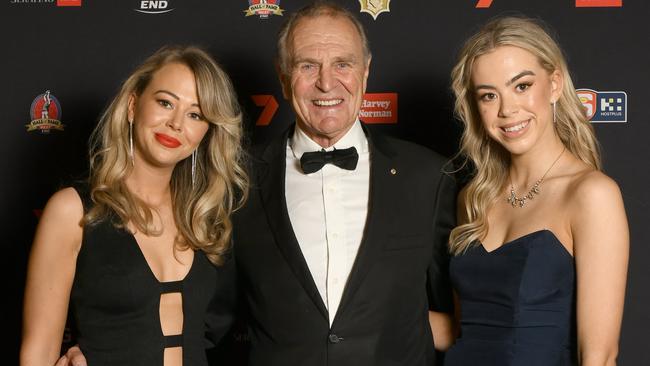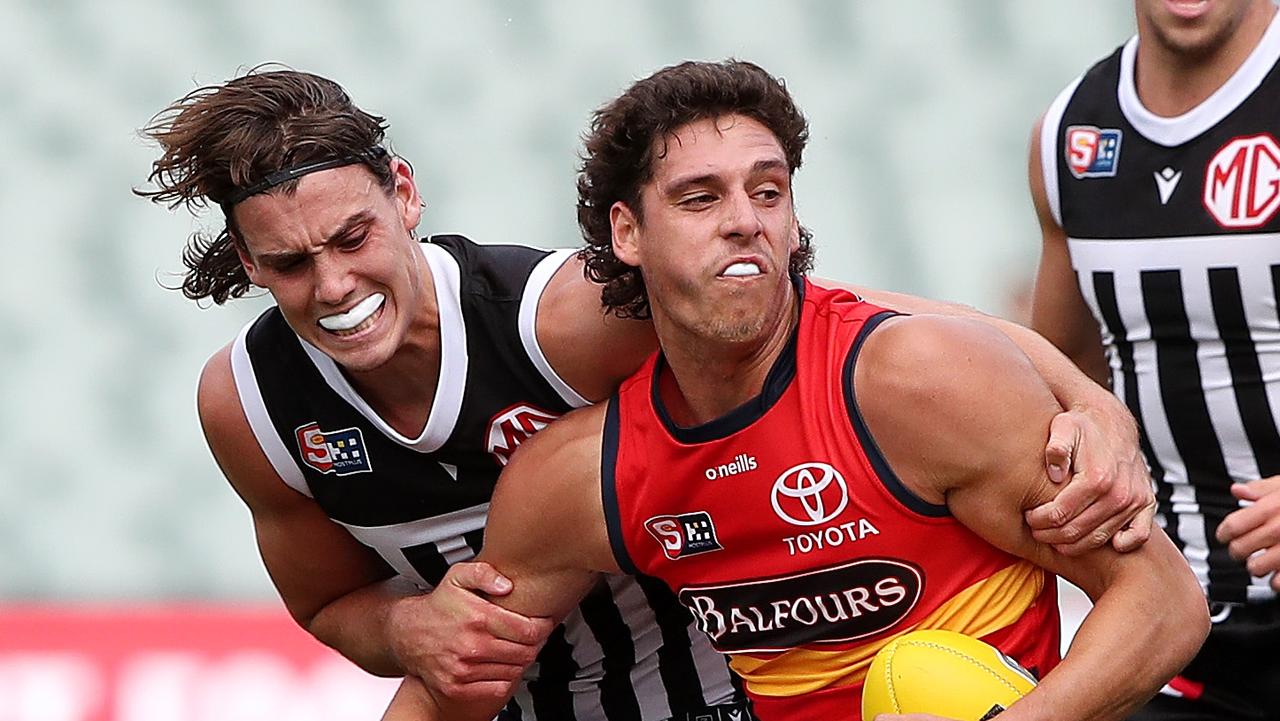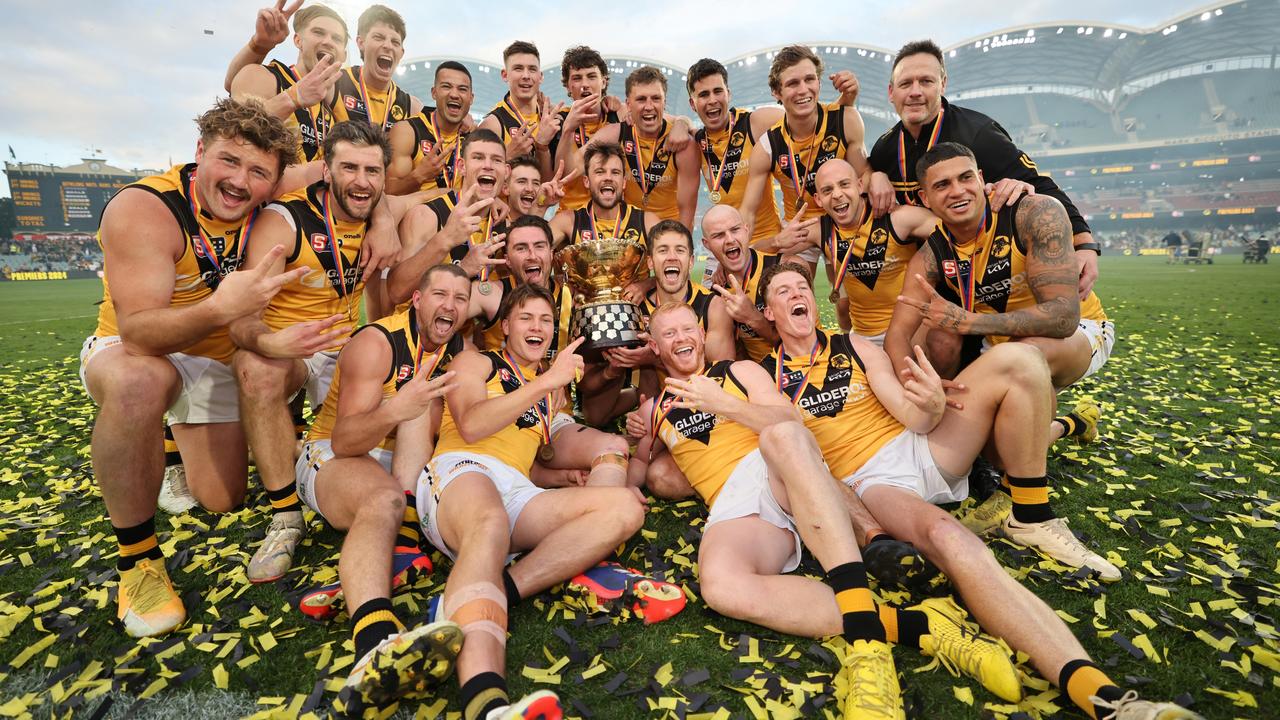Kane joins Graham and Chad in SA Football Hall of Fame
Kane Cornes has joined his dad Graham and brother Chad in the South Australian Football Hall of Fame, as one of four legendary names inducted at the Magarey Medal.
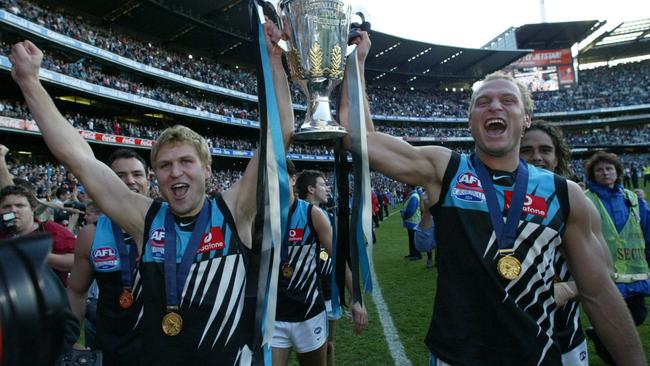
SANFL
Don't miss out on the headlines from SANFL. Followed categories will be added to My News.
He’s won an AFL premiership but Kane Cornes says his heart lies with the SANFL.
“I grew up loving the SANFL, I owe some of my best memories to that competition,’’ he said.
The youngest son of Glenelg champion and dual premiership coach Graham Cornes, Kane vividly remembers following his dad into the Tiger changerooms and mixing with “legendary players I admired so much’’.
He would stroll the short distance from his Yuill Street, Glenelg, home to the Bay oval to watch training sessions and on match days would park himself in the Tigers cheer squad and follow star full forward John Fidge “from goalsquare to goalsquare’’.
“Whichever end ‘Fidgey’ was stationed at, I’d be there,’’ Cornes said.
“That was my vantage point for the game.’’
Cornes would soon don the black and gold guernsey in games, beginning with the under-12s.
He progressed through all the junior grades to the reserves before making his league debut against Woodville-West Torrens in round nine, 2000.
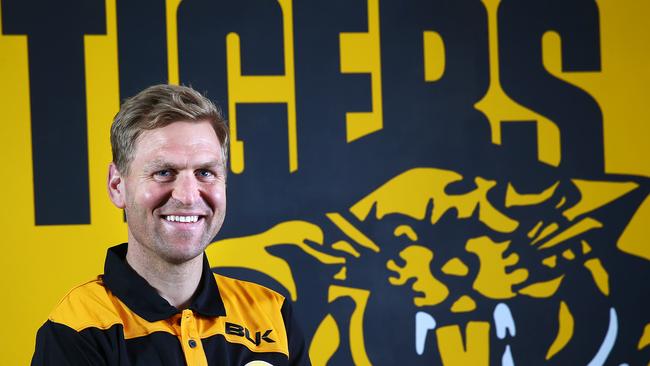
Several months later, Cornes joined older brother, Chad, at AFL club Port Adelaide after being selected at pick 20 at the national draft.
While not possessing the size, power or athleticism of Chad, Kane’s incredible desire and determination saw him carve out a stellar career which in 2015 resulted in him becoming the Power's first 300-game player.
He played a starring role in the club’s only AFL premiership in 2004, earning a reputation as a midfield ball magnet who also was able to play a tagging role and curb the influence of some of the game’s greatest midfielders.
Cornes won four Port club champion awards – equal-most with club great Warren Tredrea – and was twice named an All-Australian.
Now 39, his achievements have earned him a spot in the South Australian Football Hall of Fame, joining his dad and brother in the elite group.
“To join dad and Chad in the hall of fame is pretty special,’’ Cornes said.
“All I wanted to do when I was growing up was to be like dad and then my brother when he was coming through.
“They are a couple of great role models for me and to have dad and his two boys in the SA Football Hall of Fame is really special for the family.’’
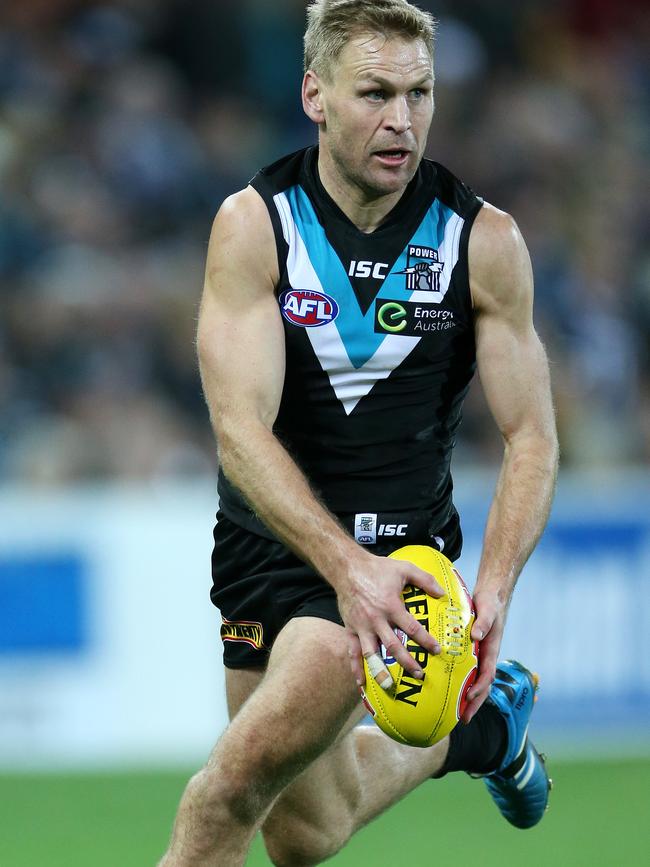
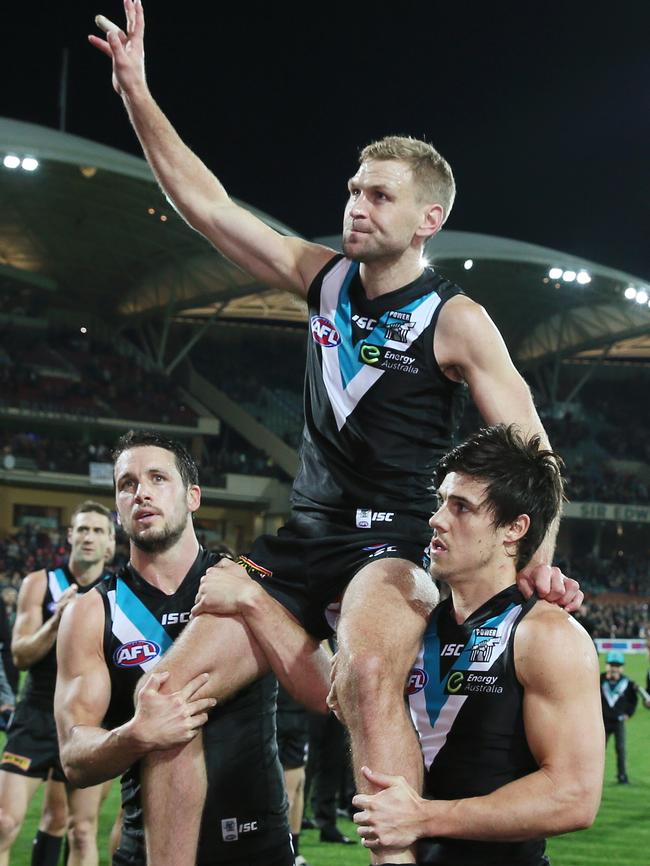
Cornes said after being told of his induction he reflected on his journey and “the people that helped me along the way’’.
“Alan Stewart was the recruiter at Port Adelaide, he took a risk on picking me because I don’t think I was a popular choice,’’ he said.
“You think about those sliding doors moments because with the next pick I was probably going to Hawthorn.’’
Cornes thanked his “incredible’’ mentors at Port, admitting he was “a difficult student because of how driven I was and how determined I was to get somewhere’’.
“Geoff Morris, my development coach, spent a heap of extra hours with me while (coach) Mark Williams and (senior assistant coach) Phil Walsh were the two who had the biggest impact on me at the footy club.
“I also want to thank all my amazing teammates who came through the doors and helped us get the success we had.’’
Cornes, who has gone on to forge a high-profile media career, was renowned for his incredible work ethic and attention to detail which helped him extract every ounce of ability out of his 183cm body.
He said it enabled him to retire with few regrets.
“I always had a motto that I used to ask myself, ‘can I put my head on the pillow and sleep well tonight knowing that I had done everything I could to be the best player I could be’,’’ Cornes said.
“Sometimes you’d say yes, sometimes you’d say no, but across the course of my career I think I can probably sleep well knowing I got the most out of what I was given.
“I wasn’t the perfect footballer by any means but it didn’t stop me from achieving some pretty special things.’’
Cornes said playing in Port’s historic first AFL premiership, when the Power upset Brisbane, which was chasing four consecutive flags, in the grand final at the MCG, was the highlight of his career.
“To get to experience that with Chad and have family and friends in the changerooms after the game, and the relief and emotions that came with that, was fantastic,’’ he said.
“But I did love the last three years of my career under (coach) Ken Hinkley because it was a bit of a bonus for me.
“I probably thought that my career was coming to an end prior to that, so I loved the fact that he made us relevant again, along with (chief executive) Keith Thomas.
“Some of the most fun I had playing footy was under Ken in that 2013-14 era and getting back to big finals at the MCG under him was something I am really thankful for, that I got to finish my career on a really positive note when it could have finished pretty negatively.’’
Matthew Pavlich finds his way back home
Matthew Pavlich grew up in the Eagles nest hoping to play at least one game for the SANFL club that meant so much to his family.
His dad, Steve, represented West Torrens 125 times from 1969-77 while uncles Mark (121 games from 1974-84) and Greg (one game in 1986) also played for Torrens.
“All I wanted to do was to follow in my dad and uncles’ footsteps and play a game for the Eagles, that was my dream,’’ said Matthew, admitting he was obsessed with the game.
“My dad and uncles were the people I idolised and looked up to the most and, being so close to it (SANFL football) because of their involvement, I could see and feel what it would be like, that it was within reach for me.
“I was given access to a senior environment at a young age and I have this visceral memory of the sounds, the smells, the language and the stories and the actions. I lived it and that helped get me ready.”
Matthew achieved much more than playing one game for the Eagles, who after merging with local rival Woodville in 1990, became the Woodville-West Torrens Football Club.
He not only became the greatest Pavlich to grace Australian football but one of the greatest players of all time.
Making his SANFL league debut for the new Eagles in 1999, the powerfully-built, 192cm Pavlich made an immediate impact by playing 21 games in his rookie season.
In a massive sliding doors moment, both South Australian AFL clubs, Adelaide and Port Adelaide, missed a golden opportunity to secure Pavlich as a 17-year-old in 1998 under a rule where each club could draft one 17-year-old.
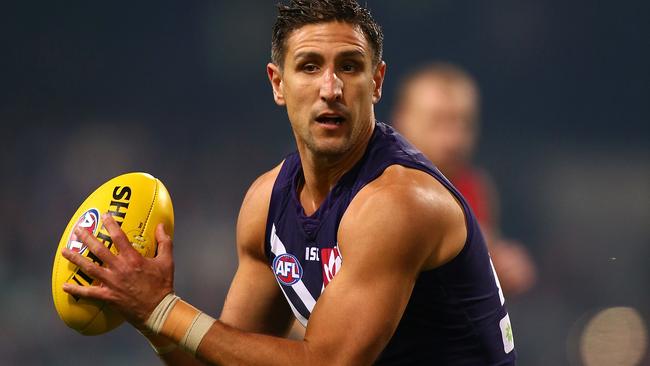
The Crows opted for Pavlich’s Eagles teammate Ken McGregor, who was more advanced in his development at the time, while Port selected Victorian Adam Morgan.
McGregor paid his dues, playing 152 games from 1999-2008, but Morgan played only three games for the Power before being shipped to the Western Bulldogs.
Port passed on Pavlich despite him being the nephew of then Power chief executive Brian Cunningham.
It was a decision the two clubs were left to rue, with Pavlich picked at No. 4 at the 2000 national draft by Fremantle.
He went on to become the greatest player in Fremantle’s short AFL history, playing 363 games and kicking a record 700 goals for the club in a 17-year career from 2000-16.
Asked whether he had ever reflected about how different his journey might have been if his hometown teams the Crows or Power had pounced on him as a 17-year-old, Pavlich replied: “No, I haven’t’’.
“I don’t think about what could have been,’’ he said.
“I think if you are always looking in the rear view mirror then you aren’t able to think clearly about what’s ahead of you.
“While that was disappointing all that time ago, I quickly moved on and still realised my dream of playing in the AFL and having a long career.’’
In a remarkable career in Western Australia, Pavlich, playing primarily as a key forward but making one All-Australian team as a defender, captained the Dockers for nine years from 2007-15.
He won six best and fairest awards, was eight-times leading goalkicker and was named an All-Australian six times.
The only thing that eluded him was a premiership, with Fremantle losing the 2013 grand final to Hawthorn by 15 points.
Pavlich was inducted into the Australian Football Hall of Fame this year.
“To play for 17 seasons and to lead your club for nine years was great,’’ he said.
“Looking back on the 2013 grand final, it would have been nice to have kicked straight on that day (8.14 to Hawthorn’s 11.11) because it could have made a difference.,
“But that aside, great memories of my career, great people that I’ve met and I established a life here in Perth, so I feel blessed to have ridden the journey, the highs and lows for near on 20 years.’’
Pavlich described being inducted into the SA Football Hall of Fame as “a great honour’’.
“I grew up being a Woodville-West Torrens and Crows supporter, admiring guys like Andrew Rogers, Andrew Taylor, Andrew Payze, Robert Pyman, Nick Pesch and Scott Camporeale at the Eagles and then Tony Modra, Mark Bickley, Ben Hart, Andrew McLeod and Mark Ricciuto at the Crows,’’ he said.
“To be inducted into the Hall of Fame and sit alongside some of the most famous names in SA football is really special.’’
Darren Wilson’s grand final umpiring record
Darren Wilson has lost count of how many kilometres his legs have chalked up.
He estimates it’s about 8000 alone in his 404 AFL games as a boundary umpire.
That doesn’t count all the other junior and senior games or training sessions spent pounding the pavement.
He is the Forrest Gump of the football world.
“There’s been a bucketload of kilometres, too many to quantify,’’ Wilson said.
“On average, when I was umpiring, I’d probably run about 90km a week – and I did that for more than 20 years.”
No-one can say that Wilson, 47, did not earn his induction into the South Australian Football Hall of Fame.
The Henley Beach-born Wilson holds the record for the most AFL grand finals officiated by a boundary umpire, with 12. When he retired in 2016, he owned the record for the most AFL games by a boundary umpire before being passed by fellow CroweaterMark Thomson two years ago.
He featured in 12 consecutive deciders from 1998 to 2009.
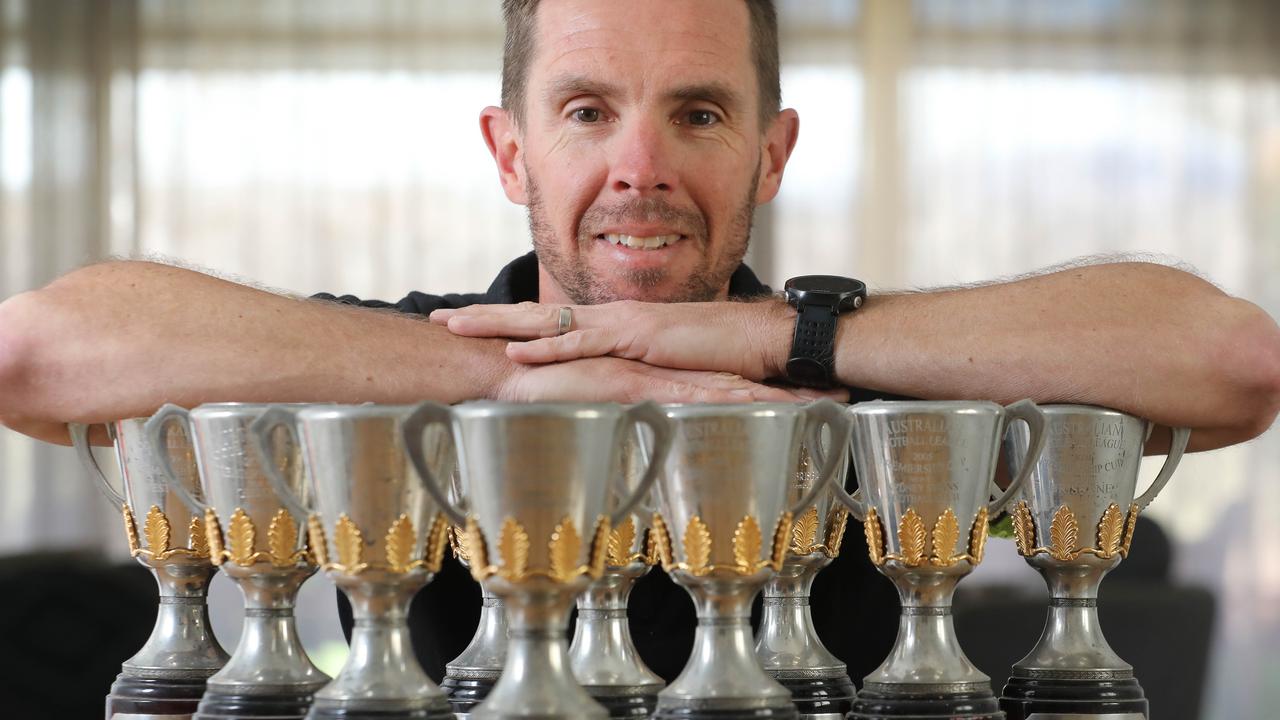
A third-generation umpire who followed in the footsteps of his grandfather, Allan, a field umpire, and father, Geoff (boundary), Wilson started patrolling the boundary line at age eight when he attended a junior game with his granddad in Victoria and one of the boundary umpires failed to turn up.
“Poppy said, ‘would you mind doing it?’. I was pretty average but I guess it kickstarted things for me,’’ Wilson said.
Wilson progressed to SANFL ranks and officiated his first league game in 1991.
A year later he was called up to the AFL, becoming, at age 17, the youngest boundary umpire to officiate in the national competitionwhen he oversaw the Crows-Collingwood game at Football Park in round eight, 1992.
“To be named for my first AFL game was phenomenal,’’ said Wilson, who at the time was still at school. His career, which sawhim cover 18-to-22 km a game, was littered with memorable moments.
“I was standing near the point post when Tony Modra took that screamer for the Crows in the goalsquare on North Melbourne’sIan Fairley’s shoulders at Footy Park in 1993,” Wilson said.
“The other moment that stands out was not being too far away from Leo Barry’s famous mark that saved the Swans the 2005 grandfinal.”
Wilson retired from the AFL following the round 14, 2016 clash between Adelaide and North at Adelaide Oval.
The first boundary umpire to receive AFL life membership, Wilson described his elevation into the South Australian FootballHall of Fame as “very humbling’’
Bruce Schultz: The man with the golden boot
Bruce Schultz was a goalkicking machine.
He only played 124 games for Norwood but kicked an extraordinary 669 goals at the remarkable average of 5.4 a game.
Only the SANFL’s greatest goalkicker, legendary North Adelaide full forward Ken Farmer, has a better average among leading goalkickers (6.3).
“The Schultz name is synonymous with Norwood,’’ said Redlegs chief executive James Fantasia.
“He was our sharpshooter, named as full forward in our team of the century.
“His feats are legendary at our club and he is held in such high regard that we’re going to name the southern end of Norwood Oval the ‘Bruce Schultz End’, opposite the Roger Woodcock End’.’’
Schultz joined Norwood in 1933 from the Jervois Football Club in the River Murray Association where, as a teenager, he had played in the 1932 A grade premiership team, kicking six goals against Imperials in the grand final.
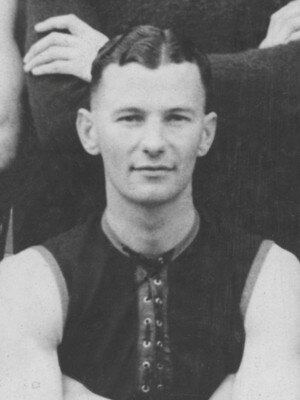
Making his league debut at age 20, Schultz kicked five goals against the Roosters at Prospect Oval in an encouraging sign of things to come.
He booted 49 goals in only 12 games for the season – four behind leading goalkicker Harry Krome’s 53 in 20 games – to help the Redlegs make the grand final for the first time in four years.
The season after, the lightly-framed, 182cm Schultz won his first of five leading goalkicker awards, booting 66.
He became the first Norwood player to reach the magical 100-goal mark in 1941 when he kicked two first quarter majors in the round 13 clash against West Adelaide.
It was to be his last league game.
Schultz suffered a serious knee injury in the same match which ended his career while he was at the peak of his powers.
The previous week he kicked a career-best 19 goals against Glenelg at The Parade.
Despite playing so few matches, Schultz, who also bagged 23 goals in six state games, sits eighth in the all-time SANFL leading goalkicker list.
Quick on the lead, strong overhead and a deadly accurate kick, he booted 10 goals or more in a game 12 times and is the Redlegs’ all-time leading goalkicker.
Also an accomplished cricketer who played two first-class games for South Australia, Schultz died in 1980 at age 66.


